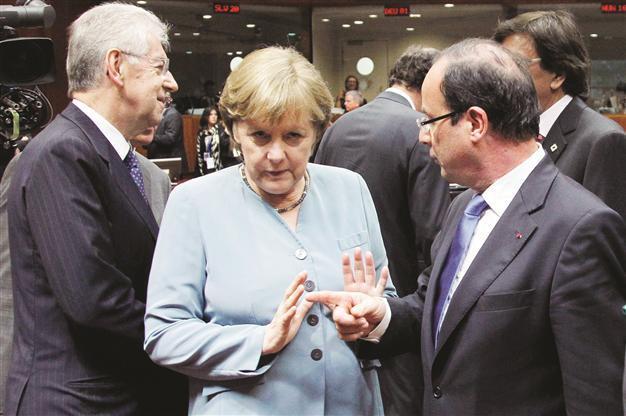Merkel continues war of words on euro’s future
BERLIN - Reuters

Italy’s Prime Minister Mario Monti (L), Germany’s Chancellor Angela Merkel (R) and France’s President François Hollande attend a summit in Brussels. REUTERS photo
Germany’s Angela Merkel criticized France’s economic performance on June 15 in a growing war of words with its new Socialist President François Hollande over how to tackle Europe’s deepening debt crisis.Describing her own country as Europe’s “stabilizing anchor and growth engine,” the center-right chancellor told German business leaders that Europe should talk about the growing gap between the bloc’s two biggest economies and traditional allies.
Hollande’s meeting with German opposition
Tension has risen so much that French Prime Minister Jean-Marc Ayrault felt moved to deny that his country was trying to form a united front with Italy and Spain against Merkel and her drive for austerity in the single currency zone.
But Merkel, possibly irritated by Hollande’s meeting with German center-left opposition leaders earlier this week on eurozone policy, took what looked like a swipe at his expansive policy ideas such as a new decree partially lowering the pension age, which was part of his election campaign. “If you look for instance at the development of unit labor costs between Germany and France in the past 10 years, then you see that at the start of the millennium Germany looked rather worse or at best as good as our neighbor in a lot of factors, while the differences have now been growing a lot more strongly, also a topic that must be discussed in Europe, naturally,” she said.
Hollande, elected last month, has also announced plans to increase the cost for companies of laying off workers after a jump in French unemployment - a move German officials and many economists believe will only exacerbate France’s economic woes.
Euro bond discussions
On June 15, Merkel reiterated her view that issuing new debt to finance economic growth is not sustainable and she again ruled out a mutualization of debt, or euro bonds, to tackle the crisis - a position directly opposite to that taken by Hollande. Hollande has spoken out in favor of euro bonds and also insists that Europe needs to do more to revive growth to offset its German-inspired focus on tackling budget deficits and public debt.
Spain bond rate in danger
MADRID - The Associated Press
The level of Spain’s debt rose in the first three months of the year, according to figures from the country’s central bank.
The Bank of Spain said in report released on June 15 that as of the end of the first quarter, Spain’s total debt -central, regional and local governments- now stands at 72 percent of GDP. That compares to 65 percent as of the same quarter last year and 68.5 percent at the end of 2011. The government has already said the rate will hit 80 percent by years end, and that was before it agreed to accept a bailout of up to € 100 billion ($125 billion) to prop up its fragile banking system.
News of the country’s rising debt levels came as the country’s closely watched borrowing rate dropped slightly Friday but remained dangerously close to the level that forced Greece, Ireland and Portugal to ask for bailouts of their public finances, and the central bank reported the country’s overall debt up sharply.
















